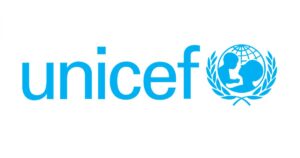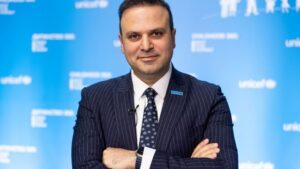
The United Nations Children’s Fund (UNICEF) has delivered 42 additional generators to Ukraine, bringing the total number of generators delivered by the organization to 106. These generators will be sent to frontline regions and cities to support critical infrastructure, according to Deputy Prime Minister for the Restoration of Ukraine – Minister of Community and Territorial Development Oleksiy Kuleba.
“UNICEF has delivered another 42 generators to Ukraine. The total amount of aid that has arrived is 106 generators with a capacity of 15.1 MW. This equipment is already being sent to frontline regions and cities to support the operation of heating networks, water utilities, hospitals, and social infrastructure. Generators of various capacities, from mobile to industrial, can serve as the main or backup power source for critical facilities,” he wrote in a Telegram post on Monday.
As the minister noted, this assistance is part of a broader winter support program: in total, UNICEF plans to transfer 255 generators with a total capacity of about 40.6 MW and a cost of almost $6.2 million to Ukraine.
Also, according to his information, two cogeneration units with a capacity of 1.5 MW and 2.3 MW have already been delivered from Kryvyi Rih to Kyiv to support critical infrastructure enterprises.
Kuleba thanked the partners for their systematic support and the communities for their mutual assistance.

The Cabinet of Ministers has approved a proposal from the Ministry of Education and Science to implement a joint project with the United Nations Children’s Fund (UNICEF) to provide financial assistance to 1,500 educational institutions for the 2025/2026 academic year.
As reported by Taras Melnychuk, representative of the Cabinet of Ministers in the Verkhovna Rada, on Telegram, the relevant decision was made at a government meeting on Friday.
It is noted that the purpose of the assistance is to ensure that educational institutions are prepared for the winter period and to increase their energy sustainability in frontline and other vulnerable regions.
The amount of financial assistance is set at UAH 420,000 per institution, provided to the founder as a lump sum for each recipient institution, with the number of recipient institutions per founder not exceeding nine.
The decision defines the main criteria for selecting institutions: status as a general secondary or preschool educational institution; location in certain frontline and other vulnerable areas; belonging to territorial communities that do not have an insurmountable level of security risk; organization of full-time or blended learning; absence of accommodation functions for students; not classified as specialized military lyceums; compliance with additional criteria established by UNICEF.
As reported, 700 schools received UAH 290,000 from UNICEF to prepare for winter and modernize school canteens in the 2024/2025 academic year.

Most parents and guardians in Ukraine are aware of their key role in protecting children’s rights, but more than a third admit that they sometimes violate these rights, and 89% of parents surveyed do not have a clear understanding of the rights of the child as defined by the UN Convention on the Rights of the Child, which covers the civil, political, economic, social, and cultural rights of children, according to the results of a new UNICEF survey.
“Although 35% of parents and 38% of adolescents have heard of the convention, only 11.3% of all respondents can say that they are familiar with its provisions. At the same time, almost 20% of parents and 15% of adolescents are not familiar with it at all,” the publication states at the beginning of International Parenting Month.
According to the survey, the best-known rights are the right to education (known to 80% of parents and 76% of adolescents), the right to health (76% and 67%), and the right to protection from violence (66% and 63%), while less well known are the right to privacy (known to 35% of parents and 45% of adolescents) and the right to identity (44% of teenagers).
“People are more aware of ‘visible’ or material rights, while ‘psychosocial’ rights are neglected,” UNICEF reports.
It is noted that educational institutions are the main source of knowledge for adolescents, and social networks are the main source for parents. Among adolescents, 34% learn about children’s rights at school, and 39% from their parents. Among parents, 41% obtain such information from social networks, and 33% from traditional media.
“The responses of parents in our survey show that they are determined to better protect their children’s rights and provide them with all the necessary support and care. At the same time, they are genuinely concerned about how their actions affect their children in such stressful times,” commented Munir Mammadzade, UNICEF Representative in Ukraine.
The teenagers who participated in the survey noted that their rights were most often violated through psychological or physical abuse, ignoring their opinions, or violating their privacy.
“We must do everything possible to protect and ensure the rights of children everywhere, including at home. Parents and guardians are going through extremely difficult times and trying to cope with the consequences of the war, so we are committed to doing everything possible to help them raise their children,” said Daria Gerasymchuk, Advisor to the President of Ukraine on Children’s Rights and Rehabilitation.
Currently, 67% of adolescents aged 14 to 18 said they would turn to their parents for protection if their rights were violated, while 24% consider teachers to be their second most important source of support.
“Parents are the main support for a child’s development and well-being, but it is difficult for them to cope alone, especially in wartime. A solid foundation for children’s rights is laid at home, but it must be reinforced by policies and services that help parents and guardians care for the next generation,” Mammadzade noted.
The survey revealed a number of characteristics, such as gender differences in perception: 81% of women believe that shouting or using abusive language is a form of violence against children, while only 68% of men share this view.
Other findings include limited family dialogue about children’s rights and well-being: only 22% of parents and 17% of adolescents reported that children’s rights are discussed in their family on a monthly basis or more often.
Another finding is that adolescents demonstrate more autonomous views of their rights. For example, 15% believe that children have the right to refuse any medical treatment, and 12% believe that it is acceptable not to attend school. In addition, 34% of adolescents value freedom of opinion, compared to 27% of parents.
It is noted that Telegram is a universal channel for both parents and teenagers: it is chosen by more than 70% of the audience as the most convenient source of information. TikTok is popular among young people (66%), while Facebook is popular among parents (56%). YouTube is used by both parents and teenagers (47% and 64%, respectively), and Instagram is used by 37% and 47%, respectively.
UNICEF has announced that it is launching a campaign to strengthen knowledge of children’s rights and calls for children to be respected and given the opportunity to defend their rights.
The survey, “Perceptions of Children’s Rights: Knowledge, Attitudes, and Experiences in Ukrainian Families,” was conducted by Gradus Research and includes responses from 600 parents aged 19 to 55 and 400 teenagers aged 14 to 18 across Ukraine.

A new study has found that most parents and caregivers believe that families should protect children’s rights, but they lack a clear understanding of those rights and may sometimes violate them.
KYIV, 3 June 2025. Almost all parents and caregivers recognize their key role in protecting their children’s rights and helping them realize their rights, but more than a third admit that they sometimes violate these rights, according to a new UNICEF survey.
The findings, released to mark the start of International Month of Fatherhood, also show that 89% of parents surveyed do not have a clear understanding of what children’s rights are under the UN Convention on the Rights of the Child, which outlines children’s civil, political, economic, social, and cultural rights.
“The responses of parents in our survey show that they are determined to better protect their children’s rights and provide them with all the necessary support and care,” said Munir Mammadzade, UNICEF Representative in Ukraine. “At the same time, they are genuinely concerned about how their actions affect their children in such stressful times.”
The teenagers who participated in the survey indicated that their rights were most often violated through psychological or physical abuse, disregard for their opinions, or violations of their privacy.
“We must do everything possible to protect and ensure the rights of children everywhere, including at home,” said Daria Gerasymchuk, Advisor to the President of Ukraine on Children’s Rights and Child Rehabilitation. “Parents and caregivers are going through extremely difficult times and are trying to cope with the consequences of the war, so we are committed to doing everything we can to help them raise their children.”
Parents may sometimes violate their children’s rights, but 67% of adolescents aged 14 to 18 said they would turn to their parents for protection if their rights were violated, and another 24% consider teachers to be their second most important source of support.
“Parents are the main source of support for a child’s development and well-being, but it is difficult for them to cope on their own, especially in times of war,” said Mr Mammadzade. “A strong foundation for children’s rights is laid at home, but it must be reinforced by policies and services that help parents and caregivers to care for the next generation.”
Other key findings from the survey show that:
UNICEF is launching a campaign to strengthen knowledge about children’s rights and calls for children to be respected and empowered to defend their rights.
Notes for editors:
The digital survey, “Perceptions of children’s rights: knowledge, attitudes, and implementation experiences in Ukrainian families,” includes responses from 600 men and women aged 19 to 55 who have children, as well as 400 adolescents aged 14 to 18. The survey was conducted throughout Ukraine by Gradus Research.
The full report is available here.
Media contacts:
Tobi Fricker
Communications and Advocacy Officer
UNICEF Ukraine
Tel: +38-050-245-67-31
Email: tfricker@unicef.org

Currently, about 3.4 million children in Ukraine have limited access to water and sanitation, said Munir Mammadzadeh, UNICEF Representative in Ukraine.
“We know that about 3.4 million children have problems with access to water and sanitation, and the problem is especially acute in the frontline regions,” he said in an interview withInterfax-Ukraine.
That is why the supply of drinking water and hygiene kits is one of the key tasks for UNICEF. In addition, the UN Children’s Fund is working with water utilities on large-scale projects to restore infrastructure to make drinking water available. According to Mammadzadeh, even if children are not directly exposed to the risk of hostilities or attacks, the lack of normal life and anxiety also significantly affects their mental health.
UNICEF pays a lot of attention to the psychological problems of children and adolescents in the context of war.
“This is one of the areas where a lot of work is being done, as 1.5 million children in Ukraine today face problems such as depression, insomnia, and anxiety. We also know that during this thousand days, children have spent 2,800 to 4,800 hours in shelters while regular alarms sound – these estimates show the scale of the war’s impact on children: since the beginning of the war, they have spent an average of 4 to 6.5 months in shelters,” Mammadzadeh said.
He noted that a number of programs are already being organized to provide psychological assistance to children in Ukraine. For example, resilience centers in local communities already include mental health components as basic services. UNICEF also cooperates with Ukrainian universities to train good mental health professionals and works with school teachers and psychologists to help them recognize the elements of anxiety in children and provide basic assistance.

Since the beginning of Russia’s full-scale invasion of Ukraine, UNICEF has managed to mobilize more than $1 billion to help young Ukrainians, said Munir Mammadzadeh, head of the UN Children’s Fund (UNICEF) in Ukraine.
“We were in the country before the war, our mandate covered development and humanitarian issues. That is, we were already working and had a presence in the regions, which helped us to launch a full-fledged response to the full-scale war and attract additional resources to help children as much as possible. During this time, we have managed to mobilize more than $1 billion for Ukraine and neighboring countries where Ukrainians have started to move because of the war,” he said in an interview with Interfax-Ukraine.
According to Mammadzadeh, UNICEF’s request for humanitarian aid for Ukraine for this year is $496 million, and 70% of this amount has been funded, which shows the interest of donor countries in supporting Ukraine. He noted that it is often impossible to attract more than 50%.
In addition, in addition to humanitarian aid to the needy, UNICEF also has programmatic activities related to development, recovery and other areas. “We are now clearly distinguishing between what is humanitarian activity – saving lives – and what is part of our development work,” said Mammadzade.
According to him, next year UNICEF plans to reduce the humanitarian request by 20% compared to this year and increase plans and requests for systemic work, i.e. the development component of the mandate, which includes social protection issues.